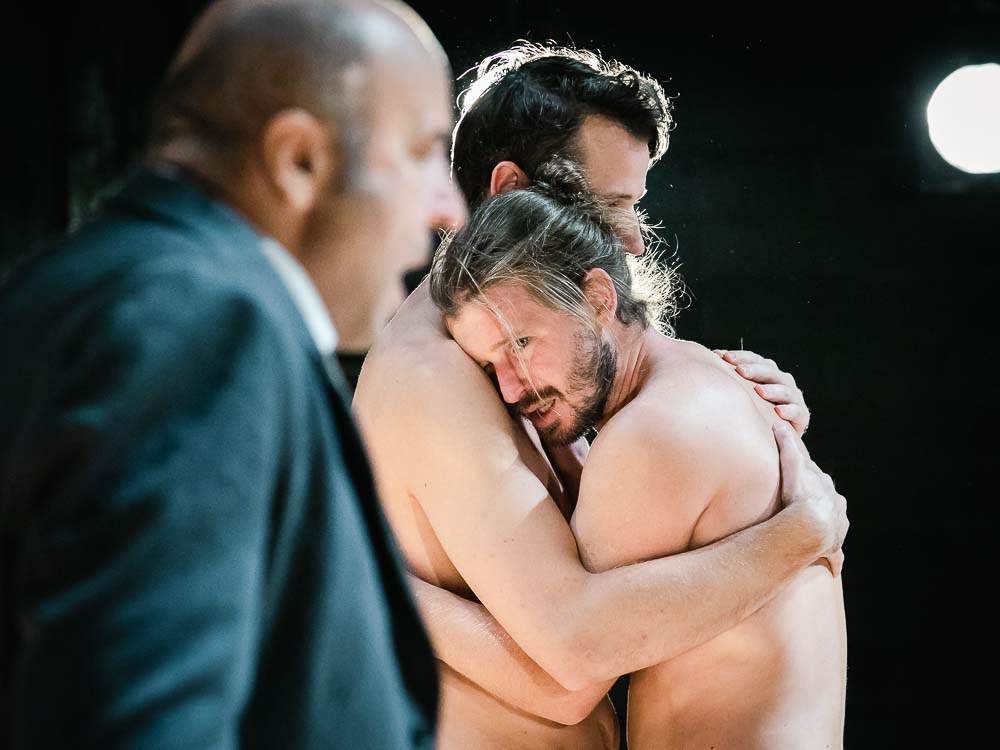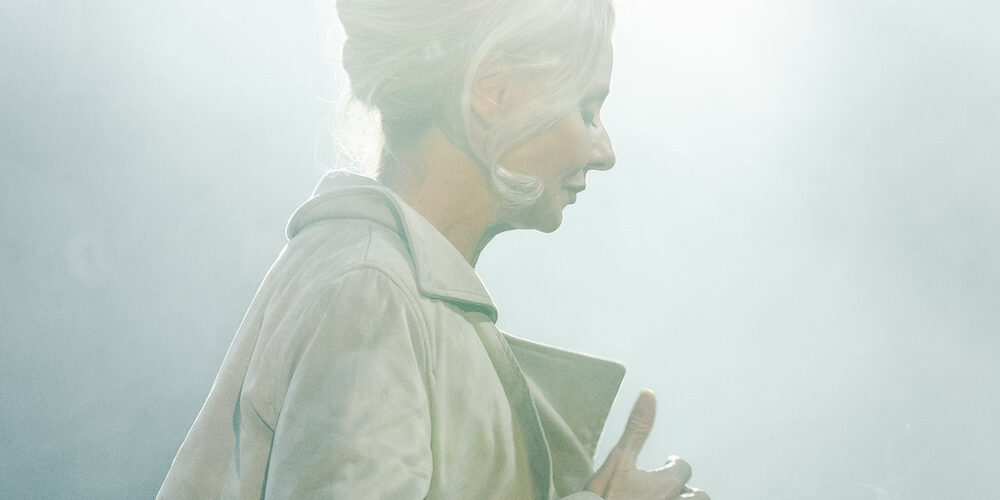Zagreb Youth Theatre, premiere 7th October 2022
Simon Stephens is a big name on the British theatre scene, going strong since the end of the last century and regularly taking English and European stages by storm. His versatility in style and form and the hyper productivity of his playwriting career, have allowed him to stay relevant as an author, a fresh, sharp voice in a complex world.
To Croatian audiences, on the other hand, Simon Stephens is an unknown. This premiere of Light Falls (2019), by the Zagreb Youth Theatre, an adaptation of one of Stephens’ more recent plays, is surprisingly the first staging of one of his texts in Croatia.
Although Stephens’ writing is deeply influenced by growing up in Stockport in the north of England, an area of the working class, of once industrial cities stripped of their economic glory, it nevertheless successfully manages to cross several borders. While Stephens is a Northerner at heart (the North also being a professional base for him) his playwriting is often concentrated around the destinies of “everyday” people, the suffering(s) of society’s quiet figures – those that work for their food and only try to survive this life cycle as best as they can.
This allows his work to be easily transported to other national contexts. Arguably, Stephens’ plays should find a very fertile ground in the socio-economic and political environments in South East Europe, maybe even more than in Europe’s western parts, thanks to the predominating working-class culture and a historical background that in some ways communicates with that of the North England. Given this, it’s truly a wonder that the Croatian theater scene managed to ignore and/or overlook Stephens for such a long period of time. Until two theatre veterans – director Janusz Kica and dramaturg Lada Kaštelan – took it upon themselves to introduce Croatian audiences to Stephens’ work, creating a spectacle that truly honours the text, following it faithfully almost to the beat – for better or worse.
By concentrating the interpretation solely on the actors’ gestures and expressions, which represent the emotional universe of the broken individuals that form the dysfunctional family of Light Falls; and by leaving the stage almost bare – only constructing a wooden platform that allows the story to jump place and time growing from fragments – the approach to the text by the Croatian creative team was one of subtlety.
While the other cast members wait their turn, sitting on simple school-like chairs at the back of the stage, Doris Šarić Kukuljica, playing the part of the mother, begins the performance by slowly painting a picture of the day of her death. It’s a death that came suddenly as the result of a stroke. This extensive monologue introduces us to her drinking problem, which had been successfully resolved yet, on the day she died, she felt an inexplicable urge to buy a bottle of vodka.
The mother transforms from a first-person to a third-person character; she becomes the spirit of the story as, like a magnet, she picks up the crumbling pieces of her family, who have been scattered with their unfortunate destinies around the north of England. These include her daughter from her first marriage, Jess (Lucija Šerbedžija), a school teacher with a binge-drinking problem; a husband Bernard (Sreten Mokrović) who is in a full-blown middle-age crisis and their children; her gay son Steven (Vedran Živolić) who is struggling with his law studies; and her daughter Ashe (Mia Melcher) a young mother who tried to kill herself and whose baby-daddy is an addict.
After the initial event of her death, Kukuljica leads us through the story-world in which all of her family members are in one way or the other, trying to heal the persevering loneliness in their hearts and lives. After a drunk night Jess wakes up with Michael (Ugo Korani) who just might be a real chance for love, Bernard is attempting to perform a clumsily grotesque ménage à trois with his lover (Nataša Dangubić) and her friend (Petra Svrtan), Steven spends a romantic night in a hotel with his older boyfriend, the flight attendant (Adrian Pezdirc), whose love Steven cannot but help doubt, and finally, Ashe deals with her estranged baby’s father (Ivan Pašalić) who comes knocking on her door claiming he is clean. But he comes too late and is still unreliable, showing up without the alimony money.
All the events take place around the same moment in time, in the hours after the mother dies, when nobody is yet aware that she is gone from this world, giving her a chance to pay a visit to her loved ones, taking a last look at them and their lives. Stephens uses this somewhat fantastical premise as a tool to unite the disparate fates of the characters who will, in the end, come together at the mother’s funeral and, in this moment that is concentrated on death, find hope for life.
Kukuljica does a wonderful job playing the silent apparition; through only the act of observing the others on stage, she acutely transfers the emotion of a mother and wife hoping, without judgement or grand expectations, that the people who she leaves in this world will overcome their personal struggles in time. One of the most striking scenes happens between Melcher and Kukuljica. The character of Ashe is the only one able to sense the otherworldly presence of the mother. The actresses engage in a dialogue that is minimalist and quiet, but that condenses all the pain, love, aspiration and desperation that envelops dysfunctional families who are somehow succeeding in staying together.
Light Falls has several other moments of acting genius, serving the audience with performance miniatures of great effect: Ugo Korani is impressive in playing the good guy forced by circumstances to do bad things; the failed threesome of Dangubić, Mokrović and Svrtan is truly a little tragical comedy in itself which brutally uncovers the pits of human despair to feel just a bit more alive, to make life a bit more spicy, and finally, the combination of the fearless acting of Melcher and Pašalić create a powerful sequence, one that feels as if it spilled from a movie like Trainspotting right onto the Zagreb Youth’ Theater stage.

Light Falls at Zagreb Youth Theatre
While Kica rightfully plays to one of Zagreb Youth Theater strengths – its ensemble – a certain disbalance of persuasiveness in the portrayals of the characters is still present and while some part of the mosaic shine, others feel off and mismatched. To be fair, this also partly corresponds to the weaknesses and strengths of the writing itself, some relations and personal narratives being more refined and compelling than others, some characters more rounded and wholehearted than others, something which is most strongly felt in Steven’s storyline.
In comparison to the European tradition which glorifies the director, British theater is a theater of the writer. Croatia is for the most part a country that belongs to the first current, that of director’s theater. By cherishing the playwright, the British theater has allowed great writing voices to emerge and flourish, something that maybe continental Europe in some of its parts struggles with: to welcome the contemporary drama as equally important as director’s theater.
The German scene is the one that embraced Stephens’ work most strongly and it seems that some of the most exciting theater is born out of this mixing of traditions (the contemporary German mainstream mostly putting the accent on directing and dramaturgy too). In its tremendous respect of the writer, British theater can sometimes suffer from static and somewhat bland productiions. It would have been interesting to see this tradition of the director who is even sometimes unscrupulous in pursuing his/her vision, being affiliated with Light Falls here, but instead this first Croatian staging has not only embraced British drama (which is a fortunate event) but also, unfortunately, taken the same, zero-level of directing common to the English theater. While Kica’s and Kaštelan’s approach to Stephens’ work is evidently done with an admiration for the author, in a way it also felt flat and thin on the stage.
With all of the empathy he weaves into the fortunes of common people, Stephen’ Light Falls at some point becomes redundant in its storytelling and because of this, for a chunk of the spectacle it feels like we are only there lingering, waiting for the writer to finish his train of thought, even though the characters have some time ago (before the funeral-finale) rounded their dramatic path.
It’s undoubtedly a pleasure to see Stephens making his way to our theater, and this premiere is far from substandard, it’s only a shame it wasn’t a more exciting initiation of this major author to our theater scene.
Credits:
Author: Simon Stephens
Director Janusz Kica
Dramaturg Lada Kaštelan
For tickets and more information, visit: zekaem.hr








